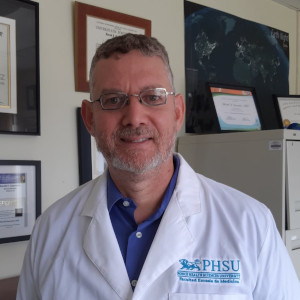Professor of the Department of Basic Sciences, Program of Pharmacology at the Ponce Health Sciences University (PHSU)
Email: hsaavedra@psm.edu
Dr. Harold I. Saavedra obtained a Bachelor of Science degree from the University of Puerto Rico, Río Piedras, where he studied the role of estrogen in the regulation of liver proteins. He obtained a Ph.D. in Biomedical Sciences from the Oak Ridge National Laboratory/the University of Tennessee, where he studied in transgenic mice how the Interleukin-3 cytokine influenced the growth of myeloid leukemias and thymic lymphomas. As a postdoctoral fellow at the University of Cincinnati and The Ohio State University, he was a pioneer in investigating using knockout mice and cell lines how oncogenes (e.g Ras and Myc, Rb) and transcription factors (e.g., the E2Fs) dysregulated the cell cycle and the centrosome cycle, culminating in centrosome amplification and chromosome instability (CA/CIN) as drivers of cancer initiation. This had therapeutic implications since CA/CIN could be reversed using specific inhibitors. As an Assistant Professor at Emory University, in research funded by K01 and R01 grants, his lab demonstrated that oncogenes and tumor suppressors dysregulated in mammary cancers (p53, Her2, Ras/c-Myc) drive CA/CIN through the G1 phase Cdks and the E2F transcription factors. He is currently a Professor at Ponce Health Sciences University (PHSU) in the Program of Pharmacology, where his research has been supported by a PACHE Partnership grant between PHSU and the Moffitt Cancer Center, the Puerto Rico Science and Technology Trust, and a current R01. His lab’s overarching goal is to reduce breast cancer survival disparities in H/L and NHB women since they have higher breast cancer-related death rates than non-Hispanic Whites. His lab’s latest investigations demonstrated that TTK and Nek2 mediate EMT and invasion of triple-negative breast cancer cells and that these kinases are overexpressed in non-Hispanic Black and Hispanic/Latino women with breast cancer. The overarching goal of the Saavedra lab is to develop novel anti-mitotic therapies that would suppress or reverse tumor growth and metastasis of breast cancer subtypes that are more likely to occur in Hispanic/Latinas (H/L) and non-Hispanic Black (NHB) women (e.g., ER-, PR-Her2- or triple-negative subtype). Currently, he is training Ph.D. candidates, a postdoctoral fellow, and MD students in his laboratory.
(Updated Oct 18, 2023)

